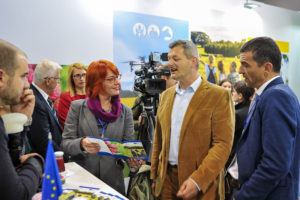
Support for Policy Reform Accession and Effectiveness (SUPRAE)
In March 2020, North Macedonia began accession negotiations with the EU. However, the country still needs to meet EU standards, enact essential reforms, and institutional capacities to comply with the acquis and clusters. The project’s goal is to assist North Macedonia in its EU accession by increasing strategic

Visibility and Communication for Actions Related to AA/DCFTA Implementation in the Framework of the EU Funded Assistance Programmes
The National Implementation Plan of the EU-Moldova Association Agreement (AA) establishes key priorities to foster political association and economic integration with the EU, including actions assigned to institutions involved in the AA/DCFTA (Deep and Comprehensive Free Trade Area). The DCFTA defines a preferential, mutually advantageous trade relationship between

Improvement of Legislation, Control and Awareness in Food Safety, Animal Health and Welfare in Ukraine
The project aims to support the implementation of the Association Agreement’s provisions between the EU and Ukraine concerning food safety, animal health, and welfare.

Capacity Building for the Alignment with the Acquis in the areas of Agriculture, Rural Development, Food Safety, Veterinary and Phytosanitary Policy
This project improves the planning, legislative, and institutional capacity of Serbia’s Ministry of Agriculture , Forestry and Water Management part of the country’s preparations for EU membership. Project supports Serbia in the EU accession process through the preparation of the Negotiation Positions and drafting or amending the national

Reinforcement of the National Social Security Fund (NSSF) in Lebanon
In Lebanon, there is no comprehensive national policy to fight poverty and a particular, effective social security system for poor people. Without improvements, Lebanon cannot hope to move towards realistically integrated and adequate social protection interventions. Thus, the project aimed to contribute to improving the quality and coverage

Technical Assistance to Support the Implementation of the Rural Development Sector Development Programme (Phase 1 + 2)
After the positive vote of the Turkish Cypriot community in the 2004 referendum to reunite the island, the European Council decided to end the isolation of the Turkish Cypriot Community and facilitate its integration with the EU. Therefore, the purpose of the project was to improve socio-economic conditions

